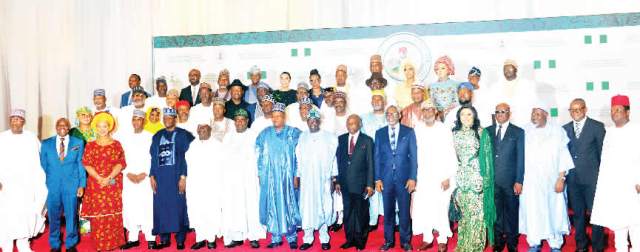Rotimi Fasan
President Bola Tinubu on Monday 21st August swore into office 45 ministers after an eleventh hour reassignment of portfolios to four of them. Gboyega Oyetola of the Ministry of Transport, Abubakar Momoh of the Ministry of Youth and Bunmi Tunji-Ojo of the Ministry of Marine and Blue Economy were respectively reassigned to the Ministry of Marine and Blue Economy, Ministry of Niger Delta Development and Ministry of Interior. Two other ministers of State in the oil and gas sector were moved to the newly-named Federal Ministry of Petroleum Resources.
Senator Heineken Lokpobiri is now Minister of State (Oil), Petroleum Resources while Ekperipe Ekpo is Minister of State (Gas), Petroleum Resources. The Federal Ministry of Environment and Ecological Management is now to be called the Federal Ministry of Environment as a result of the latest changes. With this, the president is left with only three ministries to fill. The nominees for the ministries could not scale Senate clearance as a result of adverse security reports on them. One of these three is a former governor of Kaduna State, Nasir el-Rufai, who has allegedly withdrawn his nomination and opted to pursue doctoral studies in the Netherlands.
After about two and half months without ministers, President Tinubu now has a cabinet that is almost ready to “hit the ground running”, to use an expression that has been much-abused recently. The Tinubu-led administration had come under severe criticism and mocking jibes as a result of the delay in constituting a cabinet. This, many Nigerians thought, undermined claims that the president was ready for governance. The fact that he also had to wait for more than a week after naming the ministers-designate without portfolios attached to their names was also another matter of criticism.
These apparent delays in the machinery of governance, compounded as they were by the annoying silence in the implementation of policies that were meant to ameliorate the harsh effect of the removal of oil subsidy, increased worries in some quarters that the new administration might have run out of steam so early in the day. It gave impetus to the criticisms from concerned Nigerians, including many in the opposition who would not let any opportunity slip off before attacking the president, to further call him out and label him a war monger out to deflect attention from his failing policies at home with a war with Niger.
It would not matter to these critics that President Tinubu as Chair of the Economic Community of West African States, ECOWAS, that is spearheading the opposition to the Nigerien junta was only executing his remit in light of his position in the body. The inauguration of a cabinet does not mean that the administration is out of the woods yet. There is still a lot to do beyond ministerial appointments that have suffered reversals in the designation of portfolios.
The Tinubu administration has not been shy about reversing itself on policies that have not gone down well with Nigerians. While its supporters don’t see what the problem is about that, others in the opposition believe it’s a sign of a disaster foretold from when Tinubu was declared president. One should say that the government had better made these reversals even when they are not necessarily to be cheered, than to pretend that all is well and continue down the wrong road in a bid not to be criticised. For the sake of the dire times we are in at present, every error in policy-making and execution should be corrected without delay.
The last administration that was this quick to make reversals in policy was the Umaru Yar’Adua government. That administration almost turned policy reversals (not necessarily those it made itself) into a policy in its own right, upending some of the major policies of the Olusegun Obasanjo administration and earning in its wake the ire of the retired General that piggy-backed Yar’Adua into Aso Villa in 2007. Obasanjo’s policies on deregulation/privatisation, including sale of the refineries, as well as the introduction of Value Added Tax, VAT, and monetisation of assets were reversed in short order by President Yar’Adua.
He faulted the election (mostly managed and supervised by President Obasanjo) that brought him into office and set up the Muhammed Uwais Commission. By the time, he started going after the likes of Nuhu Ribadu and Nasir el-Rufai, star boys of the Obasanjo years in power, it was as if Yar’Adua had chosen to be Obasanjo’s nemesis. Death denied Nigerians the opportunity to take full measure of the consequences of Yar’Adua’s policy somersaults. But well before his death or, in fact, years after his death his failure/refusal to see through some of the reforms proposed by the Obasanjo government have come to haunt us all and is partly the reason why we are where we are today with the Tinubu administration
*Vanguard































































